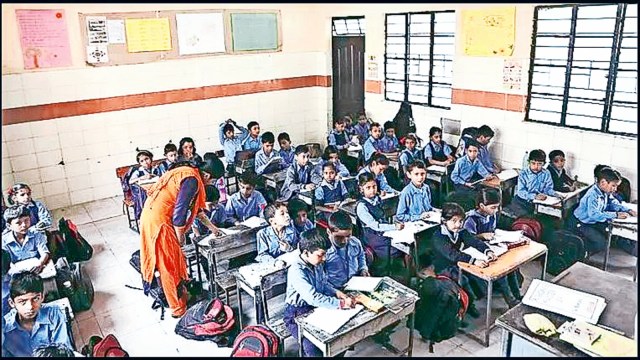
The first problem is the NEP’s structure itself. The credit-based eight-semester format seeks to create a standardised interoperable and mobility-based higher education ecosystem, where students can transfer their credits theoretically anywhere. Education is a function of reception and reciprocation, of learning, absorbing, evaluating and responding critically. We are, from a young age, asked to sit down and study. The mind needs to be sthir (steady) to engage in meaningful academic work. The gurukuls of the past created such an environment. The reimagining of higher education as an adjunct to the frenetic demands of an anxious world is to internalise the American view — education as a means to survive in the marketplace, with a huge price attached to it.
As a result of the credit-based system (where the structure determines the content and not vice versa, as it ought to be) syllabi in all disciplines have been stunted. Instead of the five units per paper students were earlier taught in my subject (for example), they are now taught three. Even the chapters prescribed have been truncated in many instances. There is a poem by Walt Whitman named ‘Passage to India’. It has 255 lines across 13 sections. Earlier, we were required to teach the entire poem; under the NEP syllabus, just 68 lines across 4 sections have been prescribed. It is a philosophical poem. It needs to be understood in its entirety. In section 12, Whitman writes “Passage to more than India/ Are thy wings plumed indeed for such far flights?”, thereby asking the West whether it is ready for the wisdom of the East. Is the soul prepared he asks, for the “Sanskrit and the Vedas?” It is exactly these things that are not to be taught to students.
Unfortunately, having to study a truncated core syllabus is not the biggest problem with NEP pedagogy. The bigger problem is one of dilution. Let us peek into the St Xavier’s University, Kolkata, syllabus for Economics Honours. In semester one, “Introductory Microeconomics” is taught as a major core subject, and “Basic Statistics” as a minor. Then there are two multidisciplinary subjects, “Understanding Human Behaviour” and “Introduction to Media Studies”. Next, there is an ability enhancement course called “Communicative English – 1”. Add to that a skill enhancement course on “personality development”. It does not end there. There are two value-added courses as well — “inter-religious studies for global citizenship” and “environmental education”. The same pattern is followed in semester two. Of the eight courses being taught, only one is in the honours subject proper; one could argue statistics is important enough as a minor subject for economics. What of the other six subjects? Are the students learning enough about the core honours subject to make them optimally employable, even if one were to argue the programme has been designed for enhanced employability? Can the other subjects not be self-learnt in the age of the internet?
The purpose of higher education is to develop the ability to engage in critical thinking in one’s chosen field of inquiry and expertise. The adjuncts to knowledge gathering do not need to be formalised into prescribed pedagogy. By diluting the core content and breadth of the subject chosen for study by an honours student, NEP is causing the lowering of standards in domain-centric knowledge dispensation and absorption.
Both of the aforementioned problems, that of a credit-based standardised protocol and the dilution of core content to accommodate the former, create the third of the many problems unleashed by NEP. Students are required to take seven to eight exams per semester. Add to that the internal assessment burden for each of these subjects, with one assignment and one class test per subject, not to mention continuous assessment. This, combined with marks for attendance separately and for continuous assessment classes attended (yes they get marks for attending classes!), creates a huge bureaucratic load that the system is not primed for. If all this is too much to take in, imagine what it must be to actually deliver in the classroom.
Earlier, under NEP, practicals were prescribed for even non-core Arts subjects, to be held on designated days with external experts on board, wherein students had to be in college for an entire day for a practical examination a few days before the university examination. Imagine teaching a value-added course like “The Art of Being Happy” and having to design a practical examination along with a viva voce. Mercifully, the University of Delhi at least has seen the impracticality of such practical examinations and removed them via a recent notification; instead, it has prescribed 40 marks continuous assessment (without specific directions on how these marks are to be determined). Such constant amendments to rules, processes and content have become so much the norm that we practitioners merely smirk at the constant churning
By and large, nobody who is a stakeholder in the university system likes NEP 2020. Clearly, the message has gone around, and there is speculation that many of the peripheral courses currently prescribed as part of the curriculum are likely to be done away with. But the bigger question remains: Will we meaningfully engage in attempting to define the true purpose of higher education? Till we do, even a revised NEP will fail to deliver what the future possibly demands of academia. The world will belong to those who produce knowledge and not to those who merely acquire the tools to consume knowledge.
The question that remains to be addressed therefore is this: How do we design universities that facilitate students into becoming producers (albeit in the smallest of orbits) of knowledge?
The writer is associate professor, Ramjas college, University of Delhi
Click here for real-time updates on the Lok Sabha Election Results 2024


